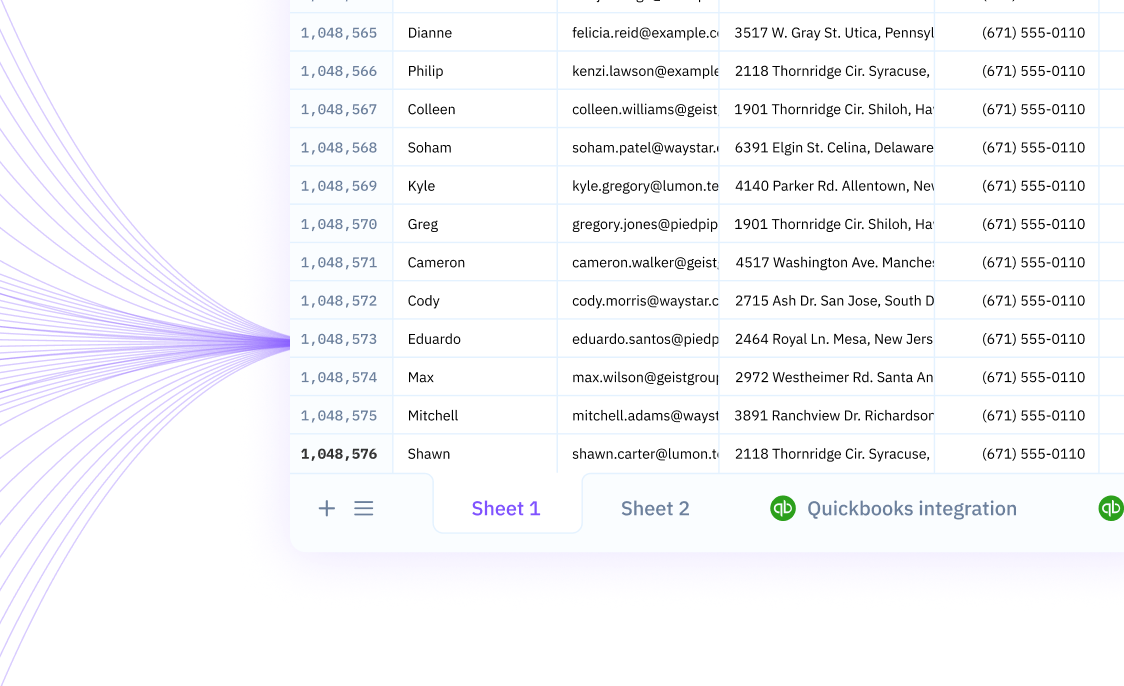
Export CouchDB to CSV

Overview
Welcome to our comprehensive guide on how to export your CouchDB data to a CSV file, a valuable skill for anyone looking to leverage their data within spreadsheet applications for enhanced data analysis and visualization. CouchDB, with its powerful list function, enables users to generate CSV files directly, bypassing the need for intermediary scripting languages such as PHP, C#, or Python. On this page, we'll explore what CouchDB is, provide step-by-step instructions for exporting your data to a CSV file, discuss various use cases for this process, and introduce Sourcetable—an alternative to CSV exports for CouchDB. Additionally, we've included a helpful Q&A section to address common inquiries about the exporting procedure. With example code and practical advice, you'll be able to streamline your data workflow efficiently.
What is CouchDB?
CouchDB is a database system that serves as an open source project. It is designed to handle the complexities of modern web and mobile applications, particularly excelling in environments where network infrastructure is less reliable. CouchDB's architecture is built to support "Offline First" applications, making data synchronization and accessibility a core feature.
The software uses HTTP and JSON for its API, facilitating easy integration with any software that can communicate using these protocols. Notably, CouchDB is built to operate on servers, from smaller setups like a Raspberry Pi to extensive cloud installations, as well as directly within mobile and web browser environments.
CouchDB ensures data reliability through its crash-resistant append-only data structure and by saving data redundantly, particularly in clustered environments. As a multi-master sync database, it supports advanced replication capabilities with the Couch Replication Protocol and can function both as a single node and clustered database. Its compatibility with HTTP proxy servers and load balancers further enhances its robustness and scalability.
Exporting CouchDB to CSV
Using a List Function
The simplest approach to exporting a CouchDB database to a CSV file is by utilizing a list function. The list function is a powerful tool that enables the direct generation of CSV content from the CouchDB database without the need for additional programming languages such as PHP, C#, or Python. This method is particularly efficient as it can handle nested hashes and arrays, which are common in CouchDB documents.
Example Code and Resources
For those looking for practical examples of how to implement this functionality, example code for exporting CouchDB to CSV using a list function can be found at this Gist. Additionally, detailed information and available list functions for CSV conversion can be accessed on the Apache CouchDB wiki, despite the presence of a dead link, at Formatting with Show and List.
Streamline Your Data Management with Sourcetable
Are you looking to integrate your CouchDB data directly into a spreadsheet without the cumbersome steps of exporting to a CSV file first? Sourcetable offers a seamless solution that syncs your live data from CouchDB, along with other apps or databases, directly into an intuitive spreadsheet interface. By choosing Sourcetable, you bypass the need for intermediate exporting, ensuring that your data remains up-to-date and accurate in real-time.
With Sourcetable, you can leverage the power of automation to enhance your business intelligence efforts. The platform allows you to automatically pull in data from multiple sources, letting you query and analyze it without the hassle of manual imports. This not only saves time but also reduces the risk of errors associated with data transfer. Embrace the efficiency of Sourcetable and elevate your data management to the next level.
Common Use Cases
-
Data migration from CouchDB to a spreadsheet applicationC
-
Backup of CouchDB documents in a human-readable formatC
-
Data analysis and reporting from CouchDB datasetsC
-
Sharing CouchDB data with systems that accept CSV inputC
-
Quickly extracting a subset of CouchDB data for external reviewC
Frequently Asked Questions
What is a list function in CouchDB and how is it used to export data to CSV?
A list function in CouchDB allows you to transform the output of a view into other formats, such as CSV. It enables you to generate the CSV directly from CouchDB.
Do I need to use programming languages like PHP, C#, or Python to export CouchDB data to CSV?
No, you do not need to use programming languages like PHP, C#, or Python. The list function provides a way to export the data directly.
Where can I find more information on using a list function to export CouchDB to CSV?
You can find more information about using a list function for exporting CouchDB to CSV at http://guide.couchdb.org/editions/1/en/transforming.html.
Is there a ready-made script for exporting CouchDB data to CSV?
Yes, Salvador Aceves made a script available at https://gist.github.com/3026004 that exports CouchDB to CSV.
Does the provided script for exporting CouchDB to CSV handle complex data structures?
Yes, the script supports nested hashes and arrays, and takes the first 100 documents as a sample for headers.
Conclusion
As detailed, exporting CouchDB to CSV can be achieved with ease using a list function, without the need for additional programming languages like PHP, C#, or Python. With resources available at the Apache Wiki and guides, as well as a ready-to-use script from a shared Gist, you can export your data efficiently, even supporting nested hashes and arrays. While the list function simplifies the conversion process to CSV, an even more streamlined approach is to use Sourcetable to import your data directly into a spreadsheet. Sign up for Sourcetable to bypass the export process and get started with your data analysis right away.


